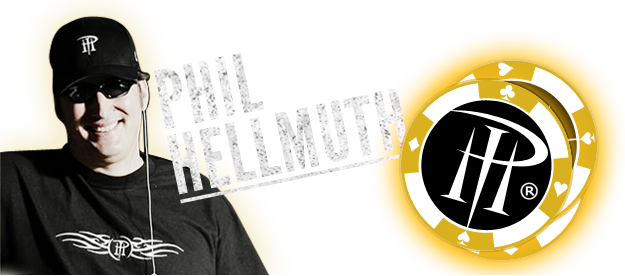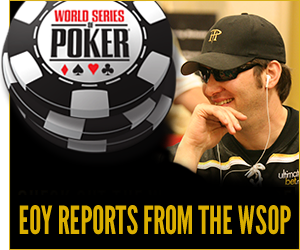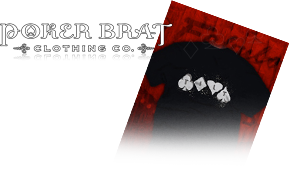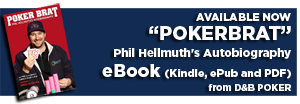-
Small Bets Can Bring Big Payoffs
This week on “Poker After Dark,” I watched a rerun from 2007, featuring Barry Greenstein, Eli Elezra, Jennifer Harmon, Phil Ivey, Allen Cunningham and David Benyamine. Usually the players buy-in for $20,000, with a first-place prize of $120,000; but in this case, the buy-in was $60,000, with a $360,000 first-place prize. I love watching “PAD”! It reminds me of the old days when I used to play primarily with great players — the same ones who regularly play on “PAD” now. These days, I’m not around the poker tour as much — until the World Series of Poker events begin — and I miss the guys (and gals). I miss the witty banter, the big mood swings (OK, that’s just me!), the intelligent conversations, the side bets, the high-stakes poker and just the feel of competing against the best. (“PAD” runs six days a week on NBC at 2:05 a.m.)
With the blinds at $300 to $600, Elezra opened for $1,500 with 5-2 on the button. Cunningham folded out of the small blind, and Harmon called out of the big blind with A-4. The flop came down K-5-2, Harmon checked and Elezra bet $1,500 into the $3,300 pot with his two pair.
-
Small-Pot Poker, with some Controversial Play
Recently, I saw the tape from the final table where I won my 11th bracelet. I remember how special that day was for me, and how remarkably the No. 11 influenced the occasion. First of all, I was going for my 11th World Series of Poker win. Second, the final table was held on June 11, 2007. And finally, my younger sister Molly, for whom the bracelet was promised years earlier, entered the world on 11/11/1971. Of course, Molly sent an e-mail to remind me that I was destined to win because of all of those elevens. Thanks, Molly — that e-mail helped me believe I would win. (It was kinda freaky.) That 11th bracelet now resides in New York City, in Molly’s home.
While I was watching the tape, I noticed an interesting hand, one that commentator Robert Williamson said I had played poorly. But here’s my take: Rick Fuller was the chip leader with $1.6 million, and I was a close second with $1.5 million. With a nine-handed table, the blinds at $15,000 to $30,000 and a $4,000-a-man ante, I opened for $90,000 with A-J. Fuller studied a while with Ks-8s and I said, “Rick, don’t make me call you down for a million when I know I have you beat!” Then Fuller called with his Ks-8s, and everyone else folded. The flop came down As-9h-5s. I had flopped top pair, and Fuller had flopped the nut-flush draw. I checked, and then Fuller checked. On the turn, the Jd hit, and I bet out $50,000 with my top two pair. Fuller raised it up, making it $150,000 to go. I called, which led Williamson to say, “That was a bad call; Phil should have reraised it there.” When the river fell Kh, I bet out $200,000, and Fuller, who hadn’t hit his flush draw, folded.
-
From All-Pro to All-In, Buss Plays it Smart
Los Angeles Lakers owner Dr. Jerry Buss (he has a Ph.D. in chemistry) is a great hold-’em player. Buss has been sparring with the best hold-’em players in the world since 1987, and he has managed to stay ahead of the game. Buss has also managed to spar with all the owners and GMs in pro basketball. Buss has been a genius both at playing hold ’em and at dealing with the rest of the NBA. He and Jerry West dealt themselves into Magic Johnson, James Worthy, Shaquille O’Neal, Kobe Bryant and many other stars. These great deals led to eight championships! Of course, Buss has owned the Lakers since 1979. He owned them when they won five titles with Magic, Kareem Abdul-Jabbar and the rest of the “Showtime Lakers.” He owned them when they had Shaq and Kobe, and they won three more titles; and he still owns them today.
On the poker side of the ledger, Buss has played hold ’em at the Bicycle Club, the Commerce Club, the Forum (in the old days) and the Staples Center for decades. In a hold-’em game, Buss can crush 99 percent of the world, but he’s not happy there. Buss constantly sits down with the top 1 percent. When Johnny Chan asked him, “Jerry, why you want to play with the best all the time?” Buss responded, “For three reasons. First, I like the challenge. Second, it is an honor to play with the best. In what other sport or profession can I sit down and play with the best players in the world? And finally, on those nights when I beat the best, now that is a great feeling.”
-
Westcott’s Crazy Like a Fox
While shooting the finale for a new reality program, the “Best Damn Poker Show,” featuring Annie Duke and me, my friend Carl Westcott went crazy. First of all, a word about the new show. It will be airing on FSN (Fox Sports Net) in January, and will feature 36 players, six of whom are sent home on the first show. A draft of nine players for “Team Hellmuth” and nine players for “Team Duke” will follow, then a series of “three vs. three” playoffs and a “three vs. three” finale. Seven episodes in all. Annie and I see all of the hole cards, and we coach before, during and after each match, and she and I have some pretty juicy fights along the way.
Without revealing the final result, I’ll dissect Westcott’s crazy play. There are several types of crazy. We have a bad crazy, a good crazy and a brilliant crazy. And Westcott’s play falls into the brilliant category. Carl noticed that no one in the finale was making a stand, and decided to play super-aggressive poker. He raised it up with weak hands (like 6-5 and J-8) all day long and won pot after pot with nothing. These free chips — blinds and antes — quickly added up. In fact, Westcott picked up so much driftwood (free money in antes, blinds, calls and raises) that he built a mansion.
-
In Wisconsin, Confidence Trumps Cards
If you spend enough time in life on one activity — golf, for example — you’re bound to occasionally witness something amazing, like a hole-in-one. I’ve played a lot of poker in my life, and I’m about to share with you one of the more incredible and entertaining hands in which I’ve ever participated. First, it did not occur on television at a star-studded event, but at one of my favorite “events” — the Wisconsin Homeboys Holiday Poker Game — last month. The blinds were $5-$5, the buy-in was $1,000 and the rebuys were at least $500 a pop. The game started at John Ferraro’s house in Pewaukee, Wis., at noon, and by midnight, there was more than $70,000 on the table.
After nearly 14 hours of play, I had earned the reputation of playing supertight. Many times during play, I called a bet or a raise with A-K or better, only to have another player raise or reraise, and when the action came back to me, I made a huge reraise myself. I watched Paul Clements lay down A-Q immediately in one of these spots, whereupon I showed my A-K. Let’s sum it up by saying this: I was playing super-solid poker, and sometimes trapping with big hands.
Here’s how the hand came down. Ferraro had the $40 “Mississippi straddle” on the button, meaning that Craig “Spa Man” Hueffner, who was in the small blind, had to act first, which he did by calling $40 with J-9 off suit.
I called with 6-3 off suit, Jon Green called and Clements made it $210 to go with A-K. Player A then called $200 with A-K — and Spa Man called the reraise. Then I announced, “I raise the pot.” I called the $160 and raised it $880 more. Clements pondered a while, and when I said, “I have nothing,” he folded, probably because he had heard me say that all day long when in fact I was holding big timber. Then Player A folded his A-K! So I turned to my last remaining opponent and said, “They just folded A-K and pocket jacks, c’mon, Spa Man, just $880 more to play with the champ.” Spa Man called the $880, and when the flop came down A-K-9 — thus pairing his 9 — he bet out $400. (And the folded players must have died a silent death, seeing that the board came down A-K-9!) -
Wisconsin ‘Homeboy’ Poker
Every holiday season, I head back with my family to Wisconsin (Madison and Milwaukee) to celebrate with my parents, my brothers and sisters and their families. We come from northern California, Minneapolis, New York, Austria and Italy. It is a special time for the Hellmuth family, and it has been our custom for more than 20 years. Along with my family tradition comes another tradition: The Wisconsin pot limit hold ’em home game with my friends. The blinds are $5-$5, and the buy-in is $1,000, with $500 re-buys. The game plays bigger than it sounds, and we allow $10, $20, $40 and $80 “straddles.”
A straddle is a voluntary blind that allows the person who places the extra blind to raise it up when the action comes back to him. A straddle makes no sense at all as a winning play. But it does promote extra action, and it also doubles the size of the game. Of course, when you’re losing a lot of money, doubling the size of the game can be useful. It may make you an even bigger loser, but it gives you a better chance to get even.
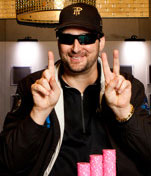
 ™
™



